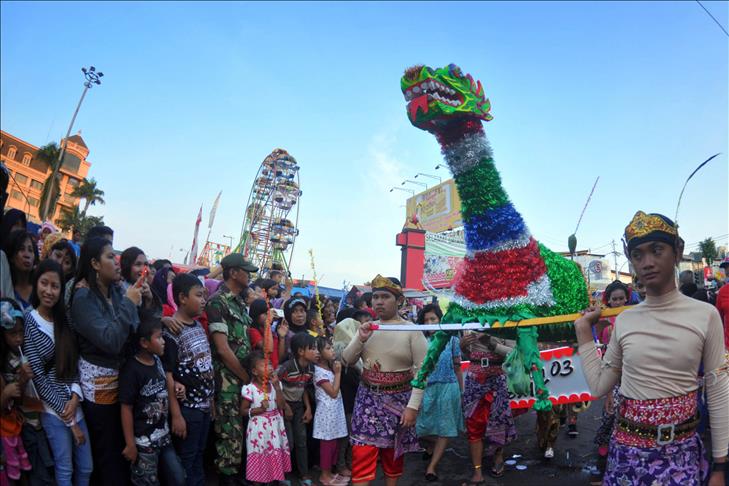
JAKARTA, Indonesia
Thousands of Indonesians welcomed Ramadan - the Muslim month of fasting - with a festival featuring dancers in traditional costume and a mascot representing the three ethnicities inhabiting Semarang city.
Performers adorned in colorful garments danced the "Gambang Semarang" while participants celebrated in the language of the Java – one of Indonesia’s tribes- during Friday’s Dugderan festival.
Around 6,000 marchers celebrated with a part-dragon, part-horse mascot – named "Warak Ngendok" - that symbolizes the coexistence of the three ethnicities living in Semarang – the Javanese, Chinese and Arabs - as well as the triumph following fasting.
Semarang resident Sulaiman - most Indonesians only use one name - told the Anadolu Agency, "I've been waiting for 2 hours with my children. There are great performances all around!"

Residents, government officials, and religious organization representatives marched about 2 miles to the city’s historic Kauman Mosque.
After Semarang Mayor Hendrar Prihadi read the decree for fasting, a wooden drum was hit and cannons fired to welcome Ramadan.
Meanwhile, the mosque’s management also handed out a traditional dish called "Ganjel Rel," meaning rail tracks, which locals believe holds blessings following prayers by scholars.
The Religious Affairs Ministry of the world’s most populous Muslim country had announced that Ramadan would start Sunday. However, the second largest Islamic organization Muhammadiyah, which uses a different calculation method for the Islamic lunar calendar, announced that the holy month would begin Saturday.

For the last two weeks, a bustling nighttime marketplace - where traders display their food items and toys while entertainers perform - has encircled the Kauman Mosque.
The mosque’s role in Ramadan traditions has been central since 1881, with residents gathering around the place of worship to learn whether the crescent marking Ramadan had been sighted.
Traditionally, the Ramadan announcement would be followed by the hitting of a wooden drum and the firing of cannons - producing the "dug" and "der" sounds after which the festival is named.


